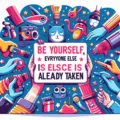Embracing Your Authentic Self: A Journey of Self-Discovery and Compassion
In a world that often pressures us to conform, embracing your authentic self can be both liberating and transformative. Being true to who you are at your core allows you to live with greater purpose, joy, and fulfillment. This journey of self-discovery and self-acceptance is not always easy, but it is undoubtedly worthwhile. Let’s explore how we can nurture our authentic selves with compassion and mindfulness.
Understanding Your Authentic Self
Your authentic self is the real, unfiltered you – the person you are when you’re not trying to please others or fit into societal molds. It encompasses your values, passions, strengths, and even your quirks. Understanding and accepting this genuine version of yourself is the first step towards living an authentic life.
To connect with your authentic self:
- Reflect on your core values and beliefs
- Identify activities that bring you genuine joy
- Notice when you feel most at ease and true to yourself
- Pay attention to your intuition and inner voice
The Power of Self-Compassion
As you embark on this journey of authenticity, it’s crucial to approach yourself with kindness and understanding. Self-compassion involves treating yourself with the same care and empathy you would offer a close friend. It’s about acknowledging your humanity, including your flaws and imperfections, without harsh judgment.
Practicing self-compassion can help you:
- Reduce self-criticism and negative self-talk
- Build resilience in the face of challenges
- Improve your overall well-being and mental health
- Foster a more positive relationship with yourself
Overcoming Fears and External Pressures
One of the biggest obstacles to living authentically is the fear of judgment or rejection from others. Society often imposes expectations that may not align with our true selves. Overcoming these external pressures requires courage and a strong sense of self-worth.
To stay true to yourself in the face of external pressures:
- Set healthy boundaries with others
- Practice assertiveness in expressing your needs and desires
- Surround yourself with supportive people who appreciate you for who you are
- Remember that your worth is not determined by others’ opinions
Cultivating Authenticity in Daily Life
Living authentically is an ongoing practice that requires mindfulness and intention. It’s about making choices that align with your values and staying true to yourself in various aspects of life.
Here are some ways to cultivate authenticity in your daily life:
- Practice honest and open communication
- Make decisions based on your values rather than external expectations
- Pursue hobbies and interests that genuinely excite you
- Express your emotions and thoughts in healthy ways
- Take time for self-reflection and personal growth
The Ripple Effect of Authenticity
When you embrace your authentic self, you not only improve your own life but also positively impact those around you. Living authentically can inspire others to do the same, creating a ripple effect of genuineness and self-acceptance in your community.
The benefits of authenticity extend beyond personal well-being:
- Deeper, more meaningful relationships
- Increased trust and respect from others
- Greater ability to empathize and connect with diverse perspectives
- Positive influence on your environment and community
FAQ: Embracing Your Authentic Self
Q1: What does it mean to be your authentic self?
A1: Being your authentic self means living in alignment with your true values, beliefs, and personality without compromising who you are to please others or fit into societal expectations. It involves being honest about your thoughts, feelings, and desires while staying true to your core identity.
Q2: How can I discover my authentic self?
A2: Discovering your authentic self is a journey of self-exploration. Start by reflecting on your values, passions, and the activities that bring you joy. Pay attention to moments when you feel most comfortable and true to yourself. Journaling, meditation, and seeking feedback from trusted friends can also help you gain insights into your authentic nature.
Q3: What are the benefits of living authentically?
A3: Living authentically can lead to greater self-confidence, improved mental health, more fulfilling relationships, and a sense of purpose. It can reduce stress and anxiety associated with trying to be someone you’re not. Authenticity also fosters deeper connections with others and can lead to more satisfying personal and professional experiences.
Q4: How can I overcome the fear of being judged for being my authentic self?
A4: Overcoming the fear of judgment starts with self-acceptance and building self-confidence. Remember that not everyone will understand or appreciate your authentic self, and that’s okay. Focus on surrounding yourself with supportive people who value you for who you are. Practice self-compassion and remind yourself that your worth is not determined by others’ opinions.
Q5: Can being authentic sometimes conflict with professional or social expectations?
A5: Yes, there can be situations where being completely authentic might conflict with professional or social norms. In these cases, it’s about finding a balance. You can still maintain your core values and authenticity while adapting your behavior appropriately to different contexts. The key is to not compromise your fundamental beliefs or ethics while navigating various social and professional environments.
Embracing your authentic self is a lifelong journey filled with self-discovery, growth, and compassion. As you continue on this path, remember to be patient and kind to yourself. Each step towards authenticity is a step towards a more fulfilling and meaningful life. By living true to who you are, you not only enrich your own experience but also contribute to a world that values genuineness and diversity.









